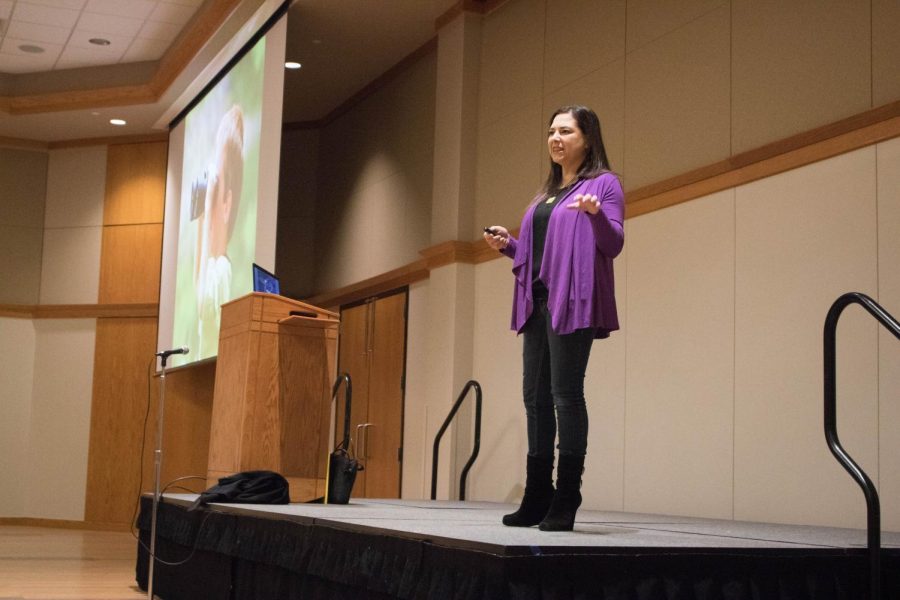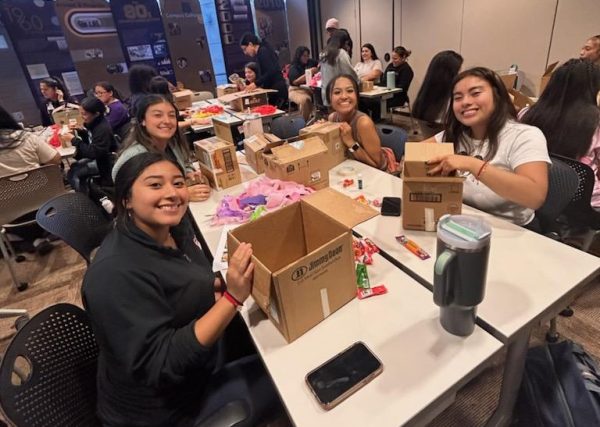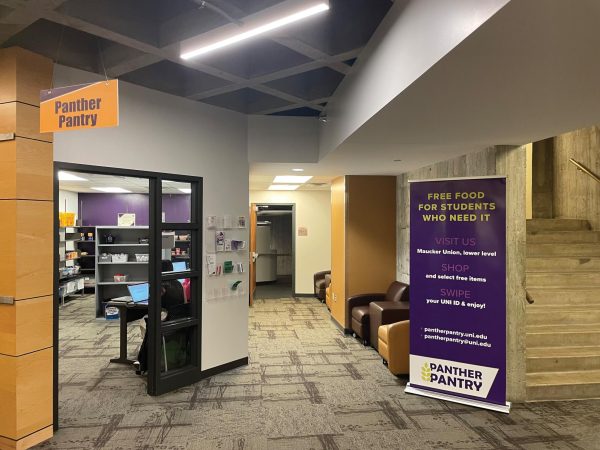Students hear how to stop bullying their body
Dietition and eating disorders expert Jessica Setback talks about body positivity in her “Stop Bullying Your Body” presentation.
Mar 1, 2018
Students had the opportunity to eat healthy food and hear about how to ‘Stop Bullying Your Body’ Tuesday night in the Maucker Union Old Central Ballroom. The UNI Body Image and Eating Disorder Awareness (BIEDA) organization supported the event. The speaker was Jessica Setnick, a dietitian and eating disorders expert from Dallas, Texas.
Setnick began her speech by bringing everyone in the audience back to a time in life where everything was seemingly carefree.
“I feel like there was a time in our lives when life was just more loose, more easy, more fun, and we didn’t get so stressed out about everything. We weren’t always in competition,” Setnick said. “When we looked in the mirror, it wasn’t like were always trying to check and see what was wrong.”
Setnick continuously brought the innocence and playfulness of childhood into her speech to help show how the pressures of adulthood can take a toll on mental health. Setnick also touched on major topics such as depression, anxiety, stress and the unrealistic expectations of society.
According to Setnick, hurtful or degrading words can do a lot of damage, because those words can mentally stick with someone for a long time.
Setnick’s presentation was not only full of valuable information, but also had lots of humorous visual aids and interactive questions. One of Setnick’s images in her presentation was of a birthday card that showed a baby with thought bubbles surrounding it, labeling the baby’s body with ‘fleshy arms’, ‘pudgy thighs’ and ‘saggy chest’. Setnick used this image as a way to explain how society puts negative labels on everyone, even when it is normal to have those characteristics.
“What we’ve been told about our bodies can have a huge effect on how we feel about ourselves,” Setnick said. “Those things can stick, even if many years later, they don’t apply at all. It can be really hard to shake that stuff off.”
Setnick also emphasized that her presentation was for anyone, not just women.
“It is so important to me that people stop thinking of body image issues as any kind of certain specific type of person, demographic, size, race or gender,” Setnick said.
Setnick ended her presentation with a message about acceptance, taking care of one’s body, and ending the war on one’s body.
“If you could get really comfortable with your own insecurities, then you don’t have to bully other people, or your own body,” Setnick said with a smile. “Being mean to yourself and saying those mean things that you would never let anyone else say to you or you would never say to someone else, is really still you walking around being victimized.”
One student who attended Setnick’s presentation was Carissa Rainey, a senior health promotion major.
“I personally grasped a lot from this presentation. I don’t have an eating disorder myself; however, I feel that it is normal, especially in society today, to occasionally have negative thoughts about our own bodies,” Rainey said. “This presentation provided me with the tools in order to distinguish a bad thought from a good thought, and how to think more positively about ourselves and how to help others as well.”
Another student who went to the presentation was Megan Steim, a junior psychology major and a member of Alpha Sigma Tau. Steim was asked by Joan Thompson, who works for Student Wellness Services, to help sponsor the event since she is the vice president of community relations in the sorority.
“I know for me personally, growing up I didn’t have the best body image, so it’s great to hear other people’s stories on them having the same issues because when you go through it yourself, you don’t think that anyone else goes through the same thing,” Steim said. “I liked hearing how Jessica specifically overcame her problems, and I liked the way she talked about how we should be talking about our bodies from now on, so I definitely took a lot from it.”
Samantha Davis, a criminology major at UNI, enjoyed the presentation not only because of the positive message it projected, but also because of Setnick.
“What I really loved about the entire thing was Jessica herself. She was so energetic, so positive and her analogies were spot on,” Davis said. “She was funny and creative, and she really kept the attention of the room. I loved a lot of the points she gave me, and it made me think differently about the little voice in my head and different things that are brought up in society. It gave me a whole new perspective.”
Setnick hoped that her presentation would encourage those with eating disorders or other varieties of body image issues to get help.
“People with eating disorders get help sometimes and that’s nice, but there’s a lot of people with eating disorders that don’t get any help, and there’s a lot of people that don’t even realize that they have an eating disorder,” Setnick said. “So, I have to get out into the community and find people where they are and say, ‘if this is a problem for you, let’s fix it.’”















